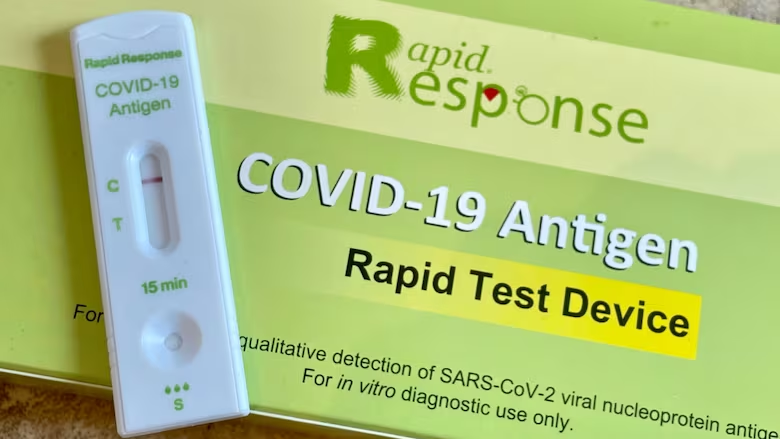As Sask. pivots to relying on rapid COVID-19 tests, experts urge caution and multiple assessments
'1 test is not sufficient to rule out COVID, you need to have multiple tests,' said one expert

A Saskatchewan woman says she did everything correctly this Christmas — using rapid tests to ensure that every member of her family could safely attend holiday gatherings.
But even with all of her preparations, COVID-19 still found a way to steal her family's joy.
Kathy Allen said her adult children travelled to Saskatoon from Vancouver and Montreal. Everyone was fully vaccinated and rapid tests were at the ready to be used as a screening tools.
Even after Allen's daughter began developing cold like symptoms she continued to test negative.
They thought the holiday could go forward. That plan quickly changed. All four family members got COVID-19.
"I'm really grateful that we had the rapid tests, but no one tested positive until they had symptoms for a few days, and I think in most of us, it was after kind of our sickest day," Allen said.
Allen said it was a stark reminder that rapid tests aren't always 100 per cent accurate.
Experts like Nazeem Muhajarine, a professor of community health and epidemiology at the University of Saskatchewan's college of medicine, agree.
"If it's a positive test, you are sure to be positive. But if it's a negative test, there is a small chance that you know, you could actually be falsely returning a test that is negative. So the false negative rates are higher," Muhajarene said.

Screening vs diagnostic
Muhajarene said COVID-19 rapid tests were originally designed as a screening tool. But the provinces' push to relying on rapid tests instead of making PCR tests widely available means that purpose is now changing, according to Muhajarene.
At a news conference at the end of December, Premier Scott Moe said that if residents test positive on a rapid test but are asymptomatic, they should just assume they have COVID-19 and immediately self isolate.
There's no longer a requirement to get a PCR test to confirm a diagnosis. PCR tests are only being recommended to those who have serious symptoms as well as those who work in health care, or long-term and personal care homes.
Even those with mild symptoms are now being asked to only take a rapid test in order to preserve PCR testing capacity.
Muhajarine says the province's decision means it is now using the the rapid tests as a diagnostic tool or something that is used to test and investigate symptoms.
Multiple tests needed
The rate of false negatives in the rapid tests means that people need to be extra cautious and use multiple tests to confirm whether they have COVID-19, according to Dawn Bowdish, an immunologist and Canada research chair in aging and immunity at McMaster University.
Vaccinated people will have a strong immune response when they have COVID-19, which means that the virus level is being kept low, she said. So although they may have symptoms such as runny noses, congestion or sore throat, an initial test may not actually come back as positive.
Bowdish said rapid tests will need to be used twice: the day a person develops symptoms and then a few days afterwards to confirm.
For unvaccinated people, such as children, or those with only one dose, the viral load appears to increase more rapidly than in the vaccinated.
That means they'll likely test positive as soon as they get the virus.
"What it means is one test is not sufficient to rule out COVID. You need to have multiple tests before you really want to rule out COVID," said Bowdish.
Muhajarine agreed. He said that if you are experiencing COVID-19 symptoms, then it's best to assume and act like you have it. That means isolating and limiting the amount of interactions you have with others.
"You have to assume that it was a probably a false negative. It hasn't built up in you. That's why the test is not not picking it up," he said.
Both Muhajarine and Bowdish urged people to be cautious about using rapid tests to swab the throat, as some have suggested it may be a better location to detect the Omicron variant.
Although data indicates the Omicron variant may be more disposed to growing in the throat area, the pair of experts say that there's no reliable data on whether rapid tests should be used to swab the throat.
Many of them were designed to work specifically in the nose and using them incorrectly could mean you're not actually getting any results at all.
"I think we had to be careful about just swabbing anywhere and everywhere that you think you might want to," Muhajarine said.
Despite the inopportune appearance of COVID-19 during the holidays, Allen said her family did eventually manage to celebrate the season.
The family held a Christmas dinner after everyone recovered.
With files from CBC's The Morning Edition

